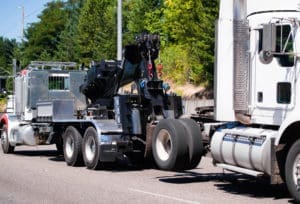If your company resembles the typical small business in America, your existence depends on customers paying for the services you provide them in a timely manner. For tows of consumer cars and trucks, that typically means generating towing invoices for the customer or interacting with one insurance company. However, when the tow involves a tractor-trailer, the payment situation becomes much more complicated and challenging.  When an accident involves a tractor-trailer, there are three different incidents going on—each involving a separate insurance provider:
When an accident involves a tractor-trailer, there are three different incidents going on—each involving a separate insurance provider:
- The truck itself,
- The trailer the truck is hauling, and
- The cargo contained within the trailer.
The first party that will typically approach you to seek their property to be returned is the insurer or owner of the cargo. This is property owned by someone other than the transport company and most frequently represents retail sales that are stagnant while sitting in your yard. The challenge for you is that once the cargo has been released, there is less motivation for the owner of the trailer to pay for the tow and pick up the trailer. The second party at your door will likely be the owner of the truck. Especially in situations where damage to the truck is minimal, the truck’s owner will be eager to have the truck towed to a repair shop and get the truck back on the road generating income. The issue here is that once the truck is towed to the repair shop, there is less motivation for the insurance company to pay for the services you provided promptly. The laws for releasing the cargo, trailer, and truck are different from state to state, and you may be required to release property upon demand. Be sure to check with your state’s laws before setting your procedures. When possible, it’s best to withhold release of any portions of the vehicle, trailer, or cargo until you’ve received full payment from all insurance companies involved.
Here are three tips for getting your towing invoices paid by insurance companies:
- Have an efficient billing process in place. By using invoicing software or even a well-designed spreadsheet, make it a practice to write your invoices the same day the service is provided. Make sure you include all the costs involved, including estimated costs for storage and future cargo loading/unloading. A per-diem storage rate in bold helps motivate insurance companies to pay more quickly. It’s helpful to categorize the charges according to the three types of insurance so you can easily track who will pay for what.
- Contact the insurance agents right away. Once the invoices are generated, make contact with the applicable insurance companies immediately. Follow the steps for filing the claims and record the claim numbers and contact information for the insurance adjusters on the invoices. Always request they pay your invoices in full.
- Provide a summary of your actions to the property owner. By providing the owner with the claim numbers and information about the status of the claims, he or she may also follow up with the insurance companies to encourage faster payment so the property can be retrieved.
If you’re looking for ways to generate more income and save on expenses, consider adding Collins Hi-Speed® and Carrier Dolly products to your team’s equipment. Our dollies make towing more manageable using the lightest equipment and safest standards in the marketplace. Our dollies aren’t meant for tractor-trailer towing but they do have the highest load rating for passenger vehicle towing. With Collins Dollies, we can get your customers out of the toughest spots. Contact us today for more information!

Leave a Reply